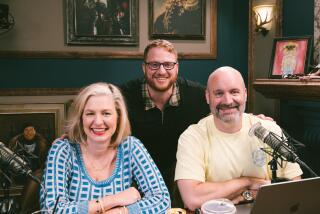Hollywood Hucksters on the Descent
- Share via
According to the 1937 tune, Hollywood’s the screwy, ballyhooey place where any office boy or young mechanic can be a panic. A different kind of panic greases the machinations of “Mizlansky/Zilinsky,” the rueful Hollywood comedy by Jon Robin Baitz, now in its West Coast premiere at the Geffen Playhouse.
In better days, Davis Mizlansky (Michael Lerner) and Sam Zilinsky (David Groh) churned out biker pictures, LSD pictures, “Hitler’s Niece” and “Dune Buggy Chickadee.” Now, it’s 1984. The winds grow colder. The partners are barely speaking. Zilinsky has relocated to New York, suffered a mild-to-moderate breakdown and withdrawn from a Grand Cayman bank $400,000 of Mizlansky’s laundered cash.
Mizlansky and his Coldwater Canyon associates, among them script reader and glorified gofer Paul (Will McCormack, playing an idealized version of Baitz), scramble to keep the Internal Revenue Service at bay. They need time to pull off a tax-shelter scam involving children’s Bible recordings. It is, Mizlansky admits, “a gray area.” This does not scare the anti-Semitic oilman (Wayne Rogers) visiting from Tulsa, interested in the tax breaks.
To Mizlansky, nothing represents a lower low than an actor “who does plays in L.A. for a living . . . Moliere at Equity Waiver.” On Melrose, yet. “Mizlansky/Zilinsky” premiered in 1985 in just such a setting. Years later, author Baitz returned to the material, expanding it to two acts. The 1998 off-Broadway premiere of the full-length version featured Nathan Lane and Lewis J. Stadlen in a lovely production staged by Joe Mantello (Baitz’s partner).
The Geffen production’s fun and shrewdly cast. Director Nicholas Martin is one of the hotter New York properties at the moment. It must be said, though, that Wednesday’s opening felt under-rehearsed, lacking in precision and polish. Baitz’s subjects may be familiar and, on the surface, easy to nail, but the dialogue isn’t. The author of “The Substance of Fire,” “A Fair Country” and others is terrific at capturing the sound of minds being changed, sentences switching direction. All those dashes and half-formed phrases and rat-a-tat-tat exchanges require real effort--invisible effort.
In the Coen brothers’ “Barton Fink,” Lerner played Jack Lipnick, a mogul farther up the food chain than Mizlansky. It was a scarifying, wonderful performance; Lerner’s motor-mouthed strains of hostility, fawning and delusional grandeur anchored some of the sharpest scenes the Coens ever wrote. The character was a more acidic version of Herman Glogauer, the know-nothing studio head (“That’s the way we do things around here! No time wasted on thinking!”) in George S. Kaufman and Moss Hart’s “Once in a Lifetime” (1930).
As Mizlansky, Lerner shares some good, flinty exchanges with Groh’s elegant, carefully modulated Zilinsky. In the earlier going, however, Lerner (fighting a cough opening night) hadn’t yet established his rhythmic change-ups. The part may in fact be larger than it is rich. Baitz loves the sound of these guys talking, and at its best, the talk is a tonic. The play itself putters now and then, low on incident. In Act 2, when Mizlansky reunites testily with Zilinsky, it’s as if we’re watching the second scene between these two, not the first.
In the production’s best performance, Richard Kline plays Lionel Hart, a Jewish actor with a stridently WASPy name, lately out of work. Kline’s scenes with George Wyner zip along beautifully. With these two, especially, the verbal dueling (in between bites of food; there’s a lot of eating in this play) is fast and loose yet tight.
Yet Baitz didn’t write a screwball comedy here. The pacing and the tone strive for a deeper, more resonant sort of social observation. In “Mizlansky/Zilinsky,” when the moral showdown between Jews and fundamentalist boob arrives, it’s pretty facile. (Wayne Rogers hasn’t figured out how to make the Okie one of those really insidious charmers.)
Baitz’s characters pine for “the old L.A.,” as Mizlansky calls it, the L.A. of Ship’s coffee shop with the toasters everywhere. In this revision, Baitz himself pines a bit--and the play’s better for it, in the end. It’s complicated nostalgia. Long before “The Blair Witch Project,” when exploitation was exploitation, guys like the guys Baitz actually worked for could get ahead. They could see clear past the smog, the moral smog, even, to their vision of success. The Geffen production may not be perfect, and the play’s modest. But these actors know these hucksters of old.
* “Mizlansky/Zilinsky,” Geffen Playhouse, 10886 Le Conte Ave., Westwood. Tuesdays-Thursdays, 7:30 p.m.; Fridays, 8 p.m.; Saturdays, 4 and 8:30 p.m.; Sundays, 2 and 7 p.m. Also: 2 p.m. April 12. Ends April 23. $20-$42. (310) 208-5454. Running time: 2 hours, 20 minutes.
Will McCormack: Paul Trecker
George Wyner: Alan Tolkin
Richard Kline: Lionel Hart
Dina Platias: Dusty Fink
Michael Lerner: Davis Mizlansky
Maury Ginsberg: Miles Brook
Wayne Rogers: Horton De Vries
David Groh: Sam Zilinsky
Andrea Martin, Swoosie Kurtz, Chris Fairbanks: Voices on speaker phone
Written by Jon Robin Baitz. Directed by Nicholas Martin. Set by Karyl Newman. Costumes by Alex Jaeger. Lighting by Geoff Korf. Original music by Peter Golub. Production stage manager James T. McDermott.
More to Read
The biggest entertainment stories
Get our big stories about Hollywood, film, television, music, arts, culture and more right in your inbox as soon as they publish.
You may occasionally receive promotional content from the Los Angeles Times.










